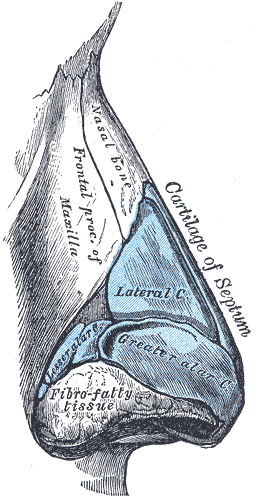Transverse nasal crease
(Redirected from Transverse nasal groove)
Transverse nasal crease is a horizontal line or groove that appears across the bridge of the nose. This crease is often associated with chronic nasal conditions and can be a physical indicator of certain behaviors or medical conditions.
Causes[edit | edit source]
The transverse nasal crease is commonly caused by repetitive upward rubbing of the nose, a behavior often referred to as the "allergic salute." This action is frequently observed in individuals suffering from allergic rhinitis, a condition characterized by an allergic reaction that causes nasal congestion, sneezing, and itching. The repeated motion of pushing the nose upward can lead to the formation of a permanent crease.
Associated Conditions[edit | edit source]
- Allergic rhinitis: A condition where the immune system overreacts to allergens in the air, leading to symptoms such as sneezing, itching, and nasal congestion.
- Atopic dermatitis: A type of eczema that can cause itchy and inflamed skin, sometimes associated with other allergic conditions.
- Asthma: A chronic respiratory condition that can be linked with allergic rhinitis and other atopic diseases.
Diagnosis[edit | edit source]
The presence of a transverse nasal crease can be a helpful clinical sign in diagnosing underlying allergic conditions. Physicians often look for this physical feature during a physical examination when a patient presents with symptoms of chronic nasal congestion or other related complaints.
Treatment[edit | edit source]
Treatment of the transverse nasal crease involves addressing the underlying cause, typically allergic rhinitis. Management strategies may include:
- Antihistamines: Medications that reduce or block histamines, thereby alleviating allergy symptoms.
- Nasal corticosteroids: Anti-inflammatory sprays that help reduce nasal inflammation and congestion.
- Allergen avoidance: Identifying and avoiding triggers that cause allergic reactions.
- Immunotherapy: Allergy shots or sublingual tablets that gradually desensitize the immune system to specific allergens.
Prevention[edit | edit source]
Preventing the formation of a transverse nasal crease involves managing allergic symptoms effectively to reduce the need for the "allergic salute." This can be achieved through proper medical treatment and lifestyle modifications to minimize exposure to allergens.
See Also[edit | edit source]
References[edit | edit source]
External Links[edit | edit source]
-
Search WikiMD
Ad.Tired of being Overweight? Try W8MD's physician weight loss program.
Semaglutide (Ozempic / Wegovy and Tirzepatide (Mounjaro / Zepbound) available.
Advertise on WikiMD
|
WikiMD's Wellness Encyclopedia |
| Let Food Be Thy Medicine Medicine Thy Food - Hippocrates |
Translate this page: - East Asian
中文,
日本,
한국어,
South Asian
हिन्दी,
தமிழ்,
తెలుగు,
Urdu,
ಕನ್ನಡ,
Southeast Asian
Indonesian,
Vietnamese,
Thai,
မြန်မာဘာသာ,
বাংলা
European
español,
Deutsch,
français,
Greek,
português do Brasil,
polski,
română,
русский,
Nederlands,
norsk,
svenska,
suomi,
Italian
Middle Eastern & African
عربى,
Turkish,
Persian,
Hebrew,
Afrikaans,
isiZulu,
Kiswahili,
Other
Bulgarian,
Hungarian,
Czech,
Swedish,
മലയാളം,
मराठी,
ਪੰਜਾਬੀ,
ગુજરાતી,
Portuguese,
Ukrainian
Medical Disclaimer: WikiMD is not a substitute for professional medical advice. The information on WikiMD is provided as an information resource only, may be incorrect, outdated or misleading, and is not to be used or relied on for any diagnostic or treatment purposes. Please consult your health care provider before making any healthcare decisions or for guidance about a specific medical condition. WikiMD expressly disclaims responsibility, and shall have no liability, for any damages, loss, injury, or liability whatsoever suffered as a result of your reliance on the information contained in this site. By visiting this site you agree to the foregoing terms and conditions, which may from time to time be changed or supplemented by WikiMD. If you do not agree to the foregoing terms and conditions, you should not enter or use this site. See full disclaimer.
Credits:Most images are courtesy of Wikimedia commons, and templates, categories Wikipedia, licensed under CC BY SA or similar.
Contributors: Prab R. Tumpati, MD

